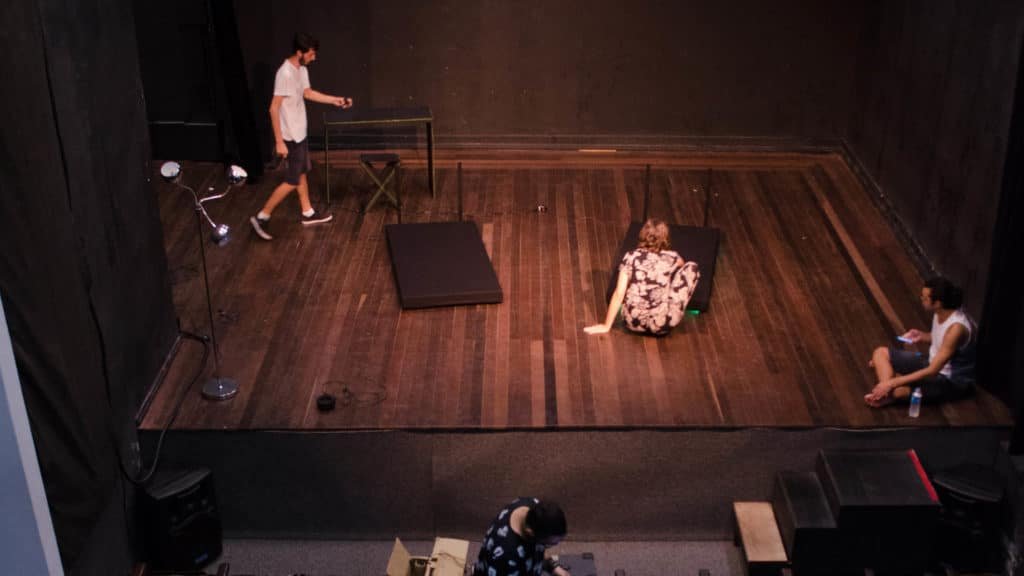Voice acting is fun. Many dream of becoming voice actors, however, it is a hard skill to learn. You wish you could do magic with your voice, but often the performance seems dull and monotonic.
In this article, we will give 14 tips and exercises to improve and elevate your voice acting skills to the next level.
Mimic famous quotes from movies

You probably already have a set of movie quotes that stuck in your head. But if you don’t you can visit this site for a refreshment. Browsing Youtube for some famous quotes will do even better because you can see how actors are performing.
Now try to mimic them. With the same pronunciation, accent, emotion and intention. You will probably do a pretty bad impression at first, but that is expected, it is okay. Do it as many times as you want. Repeating “…but I see a lot of lawbreakers here” might seem a bit silly, which it is. But that is an undeniable method to flex your artistic muscles. As a bonus, you will soon become a master of famous movie quotes and vocal improvements will be noticeable pretty fast.
Now that you finally nailed it. Try doing the same voice impression, except make sentences of your own. Apply the voice in different situations. This exercise will extend your vocal capabilities as a voice actor as you will see improvements when trying to convey different emotions.
Make character voices
This is similar to a previous exercise. Except instead of mimicking movie actors you will be looking at silly cartoon voices. Try to mimic them. You can take Goku from DBZ when he is screaming Ka-me-ha-me-hah or Sailor Moon “Eating makes me so happy!” quote. Whatever rocks your boat. The more silly the better.
You will probably feel even more silly than quoting “…but I see a lot of lawbreakers here”, but that means you are getting out of your comfort zone, learning and improving, keep it up.
After you have mastered the voice, ask your family or friends to evaluate whether you sound anything like it. It is probably going to be cringe experience, but that is what family and friends are for.
If you are shy about it, you can always record yourself and see how you sound. Be self-critical and don’t expect great success in the first few days of training. It will take time, but once you make it, it is going to be all worth it. Also, if you decide to record yourself, I urge you to keep your very first attempts to make character voice or practising quotes. It will allow later on to track your progress and improvements. In addition, it will work as motivation and you will be capable of noticing how you developed throughout the time.
Overact
Overacting is another great exercise to train your voice acting skills. I suggest you take some sort of a book, a manual or something that does not require expressing a lot of emotions. Textbooks will probably do as well.
Now try to read it overacting. I mean put all the anger in “Wash hands thoroughly after handling. Do not eat, drink or smoke when using this product” sentence and alike.
Overacting is not what you should aim for in acting, but it is awesome to train your voice and emotional range. Sometimes, even the most boring sentences could be portrayed with emotion.
If you manage to read manual and make it sound interesting, you have done your job well and it means you are learning and improving.
Read out loud
Read books out loud. It is the best you take a novel with multiple different characters. Now try to create and memorize voice for each of them. If a book has hundreds of characters you will probably have to create a general voice for some of them.
For more memorable characters create unique voices and write down some notes about them such as “lazy, grumpy, doesn’t care much about anything except food”. It will make it easier to maintain the same voice for a character, especially since it is hard to remember all of the character voices in the book.
It is going to be tough creating a unique voice for many different characters, but it will help you to train your voice acting muscles.
Articulation
Training your voice is just as important as learning to act. Having a unique voice could be an advantage in the voice-over industry, but being inarticulate will be a huge drawback no matter what character you are trying to portray.
Here is a list of exercises to make your voice sound more articulate:
- Tongue twisters
- Creating “rrrrr” sound with the tongue
- Practising saying “Unique New York, New York unique” as fast as possible
- Reading out loud
- Lip trills
Take acting classes

Voice acting as the phrase suggests is after all acting. Despite not standing and performing in front of the audience or cameras, you are still acting in front of the microphone. Yes, no movement is required (although some voice actors love to express emotions through hand gestures and face expressions), but you are still acting with your voice.
Taking acting classes will serve you really well while learning how to do voice acting and voice-overs. Also, you will go out of your comfort zone and meet a lot of similarly minded people which is always great.
The same principles apply in acting as in voice acting. If you manage to find a decent acting instructor she or he will notice your skills gaps and give personal tips on how to improve your acting which will translate to voice acting very well.
Breathe from diaphragm
Breathing from the diaphragm will give more air for your lungs to work with. This means less frequent breathing and stronger voice that fills the room. It is one of the key aspects in voice over training to learn breathe from your diaphragm.
In addition, if you are striving for a deeper voice, learning to breathe from your diaphragm will help with that too. You will notice deeper breathing makes you more relaxed and at ease which is the way it should be when doing voice over.
To breathe from your diaphragm develop a habit to breathe consciously using a diaphragm for at least 10 or more minutes per day. You can do that while commuting to work or doing whatever daily tasks.
Another great way to strengthen diaphragm is laying down with some weight on your stomach and lifting it with the belly when breathing through diaphragm. The weight will train your diaphragm and it will stimulate you to use the diaphragm for breathing unconsciously.
In the end, it will make a huge improvement in your voice acting. That is one of the essential skills you ought to learn before further pursuing voice over career.
Learn new accents
When you start practising voice acting it is nice to know a few different accents. That is definitely not a must and you can probably get work with whatever accent you currently naturally own, but learning new accents might increase the range of voice over jobs you can get.
If your accent is very specific, it will be easy to get the work that meets your requirements because the competition is going to be low, but such work will be very scarce.
Learning a new accent will open some of the opportunities. If you already own a generic English – American, or English – British accent you may wanna try and learn something a bit more specific and vice versa, if you own a specific accent you may wanna learn something more generic.
Also for people who know languages besides English keep in mind that you can get jobs in your native language as well and the competition is probably much lower for such jobs.
Singing
If you do singing that is great. Singing involves a lot of voice exercises which is just as useful for voice acting training as for singing. Being able to reach a wide range of frequencies with your voice will expand your capabilities as a voice actor.
If you are not a singer don’t fret, you don’t have to be. But if you love singing, know that it does good for your voice acting skills and if you needed reasons to start learning singing you can add getting better at voice acting and training your voice to the list.
Audition a lot
Auditioning is a great way to practise while at the same time you are applying for a job. You can go to a voice.com, voice123.com, ACX, Fiverr, Castingcall and many more websites to look for a chance for an audition.
I wouldn’t expect to land a job quickly, but auditioning for various gigs will give you an idea of what kind of voice, skills, accent and level of skill people are expecting of you.
It is a great way to train your awareness in the voice acting industry. You can also try looking for some unpaid job offers in Reddit if you want to get feedback for your work. There is a great community for voice actors that you can join and follow.
Learn software
Learning software is very important for your voice over career. When you start out and even later in your career you will not only be a voice actor but a sound engineer since it is most likely you will be working alone.
Hence, learning software is essential. Your audio recording will have to meet requirements such as RPM and you should be able to record without clipping and make your recording not too quiet, but not too loud to sound just right. It is a hassle. And if you ever want to dabble in EQ it is a complicated science on its own.
I recommend you choose free software at first and once you settle your foot in the voice-over industry you can start looking at other, paid DAWs. Audacity is a great tool for starting out and it is free, you can download Audacity here for Windows, Mac or Linux.
Reaper is also a great DAW if you don’t mind spending $60 for a one time fee. It is one of the cheapest options since that is a one-off price instead of a recurring charge. Also, Reaper is pretty good and trusted by professionals in the field. Some of which swear by it.
Read script beforehand
It is important to read a script before you start recording. Don’t skip on this part, it will make your life so much easier. Often if you try recording script without actually reading it, you will misunderstand it and have to record it all over again.
When reading a script, try to imagine what message script tries to convey. Often your client will provide some guidelines, but there will be occasions where you have to trust your instincts.
Also, it is easy to read a short script. If you are dealing with a book it could mean you will be reading it for hours long. I still suggest you read it thoroughly. It will improve your recording speed and quality. If it is an extremely long book, you may even want to read each chapter again before you start recording.
Knowing what the book is about before starting recording will give you an advantage of knowing what are the hidden character motives and intentions and you will understand their personalities better. All the extra effort will improve your voice acting performance and if you are eager to learn, you may as well read the whole book out loud for yourself. That would make you more realistically realize what to expect and it could be a part of your training routine.
In anyway, reading script beforehand will improve your performance.
Exercise

Exercising and having a good balanced diet will make sure you are fit. It is not a necessary requirement, but being fit will help with breathing and your lungs capacity. It will mean you can inhale and exhale more air which is important for your performance.
Improving your general fitness level will allow you to keep a good posture, have less pauses when recording and have a more powerful voice. Besides, it is good for health.
Get a voice acting coach
Similar to attending acting classes voice acting coach will help you to deal with personal difficulties. A good coach will be able to tell what you are good and where you should focus more to fill the gaps.
Just be wary, there is a lot of voice acting coaches that preach to teach you the best techniques and make you an award-winning demo reel and do it “just” for a couple of thousands. There is a lot of scams, make your research before getting such a deal especially if it involves a lot of money. And as per usual, if it looks and sounds too good to be true, it probably is.
Mic techniques
It is important you know how to speak into your microphone. Good mic positioning will help to avoid a lot of plosives and clipping.
Don’t speak directly into your microphone. Position it facing to your mouth, but your mouth shouldn’t be directed to the microphone if that makes sense. The air coming from your mouth when speaking should get by the microphone without hitting its diaphragm.
Do not follow punctuation
In voice over punctuation is not always necessary to follow. When reading trust your instincts more than syntax. Syntax was made to interpret people talking and doesn’t always sound good when read out loud.
It is not a rule, some syntax is necessary even when reading and you ought to make small pauses. But many commas can be skipped without making a pause. Dots could be skipped as well, but not as frequently as commas.
Also, when narrating books you can take out ‘she said’ and ‘he said’ type of phrases. It will make your recording sound more natural.
Get good equipment
There are diminishing returns when buying extremely expensive equipment, but don’t skimp on microphone. If you aim to become a professional voice over artist your equipment must provide sufficient quality.
No matter how good you are with your voice bad audio quality won’t get you no auditions.
Aim to get an XLR microphone instead of USB. A good starting point is somewhere around 230$ for a decent condenser microphone. You will want to spend at least another 100$ for an interface, mic stand, shock mount and pop filter.
For a more in-depth guide on affordable, quality microphones check out this article. It has a comprehensive list of both condenser and dynamic XLR microphones in different price ranges.
Find good space

You need to find a good space in your house or apartment to record audio. Look for a space that has soft material in it. It could be big soft carpets, thick drapes, sofa, bed, etc. Anything that is made of soft material and could absorb some of the reverb.
Avoid rooms that have reflective surfaces such as tiles, metal, glass. Very large or very small room don’t do well either.
Also, when positioning yourself try not to be too close to a wall, otherwise, the sound will hit right back at your microphone.
You can find many more tips on improving your environment for recording in this article.
Listen to audiobooks
You need to listen to other people doing the jo to see a good example of voice acting.
If you don’t know any narrators I offer you to listen to Patrick Fraley and Scott Brick. They are some of the best in the industry. Also, any bestseller book will probably be narrated by an awesome narrator.
When I am listening to some of the great narrators I get motivated and eager to train harder and perform better.
Conclusion
There are a bunch of great ways to train your voice acting skills. Many of which involve training your emotional range when doing a voice-over.
However, as a freelancing voice actor, you will most likely have to do everything yourself, which includes audio engineering, looking for auditioning opportunities and providing the voice-over.
Hence, you will have to practice more than just one skill to improve and get good at voice acting.
Here is a quick summarization on what exercises and tips will make you improve your voice acting skills:
- Mimic famous quotes from movies
- Make character voices
- Overact
- Reading aloud
- Articulation
- Take acting classes
- Breathe from diaphragm
- Learn new accents
- Singing
- Audition a lot
- Learn software
- Read script beforehand
- Exercise
- Get a voice acting coach
- Good mic technique
- Listening to audiobooks
- Choosing the right space
- Don’t follow punctuation

Pingback: 10 Reasons for Becoming an Audiobook Narrator – Voice Over Tip
Pingback: How to Sound More Masculine? - Voice Over Tip
Pingback: How to Get Deep Voice Fast? - Voice Over Tip
Pingback: How to Sound Happy? - Voice Over Tip
Pingback: How to Enunciate Better? - Voice Over Tip